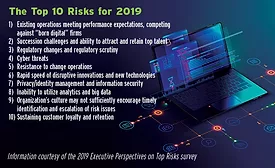Home » data breach
Articles Tagged with ''data breach''
How to Protect Your Access Control System Against Cybercrime
Responding to the Evolving Threat Landscape
December 11, 2018
Has Cybersecurity Become the Definition of Insanity?
After years of breaches, stolen data, CIO/CISO resignations and huge impacts to business reputation, it’s time for the industry to rethink its approach to network security.
December 6, 2018
Healthcare Organizations Falling Behind on Cyber Risk Management
Only 29% of healthcare organizations report having a comprehensive security program in place.
December 1, 2018
Who's Responsible for Cloud Security?
Cloud security is a shared responsibility. Consider these three key questions before outsourcing.
December 1, 2018
Sign-up to receive top management & result-driven techniques in the industry.
Join over 20,000+ industry leaders who receive our premium content.
SIGN UP TODAY!Copyright ©2026. All Rights Reserved BNP Media.
Design, CMS, Hosting & Web Development :: ePublishing










